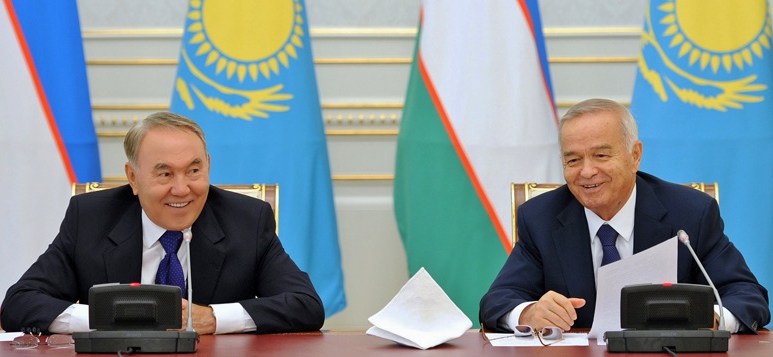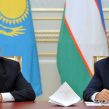
Karimov-Nazarbayev Summit Signals Shift in Central Asian Security
Publication: Eurasia Daily Monitor Volume: 10 Issue: 115
By:

On June 13–14, Kazakhstan’s President Nursultan Nazarbayev arrived in Tashkent for a summit with his Uzbekistani counterpart Islam Karimov. Although media coverage of this meeting differed in both countries, the summit witnessed the signing of a “strategic partnership” between Astana and Tashkent. Equally, despite the nuanced features of reporting the summit in each country’s media, the issue of security in Central Asia in the context of the North Atlantic Treaty Organization’s (NATO) drawdown of combat forces from Afghanistan in 2014 was in fact prominent on the agenda. The Kazakhstan-Uzbekistan strategic partnership, if it proves viable, may signal a weakening of Moscow’s security role in Central Asia (KazInform, Uzbekistan MFA website, UzDaily.com, Tengrinews, June 15).
Indeed, the reporting of the summit in Tashkent received scant attention in the Russian media, though the strategic partnership announcement did enjoy some publicity. Interfax referred to the document being signed in Tashkent by Presidents Karimov and Nazarbayev on June 14, adding that it is linked to defining cooperation in “politics, trade, economics, culture and transportation.” No mention was made of any security elements in the agreement or to the priority placed on security in the bilateral discussions. It may be that Interfax referred to the clutch of additional agreements signed during the summit. However, the report noted Nazarbayev had said that Central Asia’s security “greatly depends on cooperation between the two countries” (Interfax, June 15).
Kazakhstan’s media provided some information on the number of agreements signed during the summit, and confirmed the signing of a strategic partnership. Agreements were inked on customs cooperation, trade agreements, and boosting bilateral interior ministry ties. Moreover, the Culture and Information Ministry of Kazakhstan and the Culture and Sport Ministry of Uzbekistan signed a bilateral agreement in the sphere of culture for 2013–2015 (KazInform, June 15).
Kazakhstani government websites highlighted the importance of the summit and this also extended into the opening of a new embassy building in Tashkent. Both presidents attended the opening ceremony of the new Embassy of Kazakhstan and a monument to the Kazakh poet Abai. Nazarbayev praised the bilateral relationship with Uzbekistan, which he said was “developing in all spheres.” The Kazakhstani leader also explained that the new embassy building and monument to Abai proves that both countries are interested in deepening ties and promoting respect for each other’s country. Nazarbayev, according to reporting in Astana, expressed satisfaction with the content of the discussions during the summit (Kazakhstan’s MFA, Presidential Press Service, Akorda, June 14).
Understandably, reporting of the summit in Tashkent was both extensive and effervescent, covering all aspects of Nazarbayev’s two-day visit. Uzbekistan’s foreign ministry stated, “All the necessary prerequisites are created today for a multifaceted, fruitful and long-term cooperation owing to the firm political will, the profound mutual understanding, the robust agreement and normative base, and the garnered expertise in constructive interaction.” The statement continued, “The evolution of relations between Uzbekistan and Kazakhstan acquires a particular importance not merely in the sense of their long-term prospects, but also in terms of stability and prosperity of the entire Central Asia. Deliberating on regional security, Islam Karimov and Nursultan Nazarbayev noted the interest of our two nations in the soonest resolution of conflict in Afghanistan and positively appraised the two countries’ input into the endeavors aimed at reviving Afghanistan’s economy” (mfa.uz, June 15).
Indeed efforts to strengthen bilateral cooperation will also extend into multilateral formats, limited to the United Nations, the Commonwealth of Independent States (CIS) and the Shanghai Cooperation Organization (SCO); after Tashkent’s de facto exit from the Collective Security Treaty Organization (CSTO) in 2012, no mention was made of this organization or of Uzbekistan re-joining in the future. But these efforts to promote multilateral formats other than the CSTO as well as the defense and security elements of the strategic partnership raise very sensitive and pressing issues for both countries (mfa.uz, UzDaily.com, June 15).
Karimov and Nazarbayev stressed the importance of boosting bilateral cooperation in “countering terrorism, drug trafficking, religious extremism, separatism, transnational organized crime.” They also discussed a wide range of issues including bilateral trade and water issues in Central Asia. According to Uzbekistan’s foreign ministry “The Agreement on Strategic Partnership between the Republic of Uzbekistan and the Republic of Kazakhstan” stresses “core principles and priority directions of bilateral cooperation in political, trade and economic, transport and communications, water and energy, environmental, cultural and humanitarian, military-technical, and other areas. The signatories verify their integrated and coordinated posture toward the development of a fair system of water use in Central Asia.” The foreign ministry also mentioned the additional agreements to strengthen cooperation between the customs service and interior ministries in each country (mfa.uz, UzDaily.com, June 15).
Although the strategic partnership contains references to “military-technical and other areas,” the question is what is driving this process of closer “strategic” cooperation between Astana and Tashkent since each state regards the possible impact of the NATO drawdown in Afghanistan in different ways. For Tashkent, the post-2014 security environment in Central Asia will experience greater testing linked to instability in Afghanistan, while official security documents and expert opinions in Kazakhstan adopt a more positive stance on the post-2014 period. It is unlikely that boosting bilateral defense and security ties is driven by a sudden unity of position on Afghanistan and post-2014 regional security (KazInform, mfa.uz, UzDaily.com, Tengrinews, June 15).
The shift in Central Asian security marked by the Astana-Tashkent strategic partnership is implicit in Nazarbayev’s comment: Central Asia’s security “greatly depends on cooperation between the two countries.” Astana now recognizes that efforts to involve Tashkent in Central Asian security mainly functions at a bilateral level. In practical terms, the CSTO could further weaken as a result, with an additional bilateral route to crisis management serving as an alternative. If the strategic partnership has real meaning, and the unreported security discussions undoubtedly fed into this agreement, then it suggests that a future security crisis in Central Asia necessitating joint action may be dealt with in this manner—and thus avoid any recourse to Moscow. The strengthening of bilateral security cooperation, meanwhile, seems to focus on border security, intelligence sharing and discussing ways of jointly countering terrorism, extremism and other trans-border security issues. Still, each country possesses distinctive and frequently contradictory views on the nature of the threats that may emerge following 2014. Yet, the new agreement signals a political willingness to explore bilateral mechanisms to face these security issues in a new way: together.




